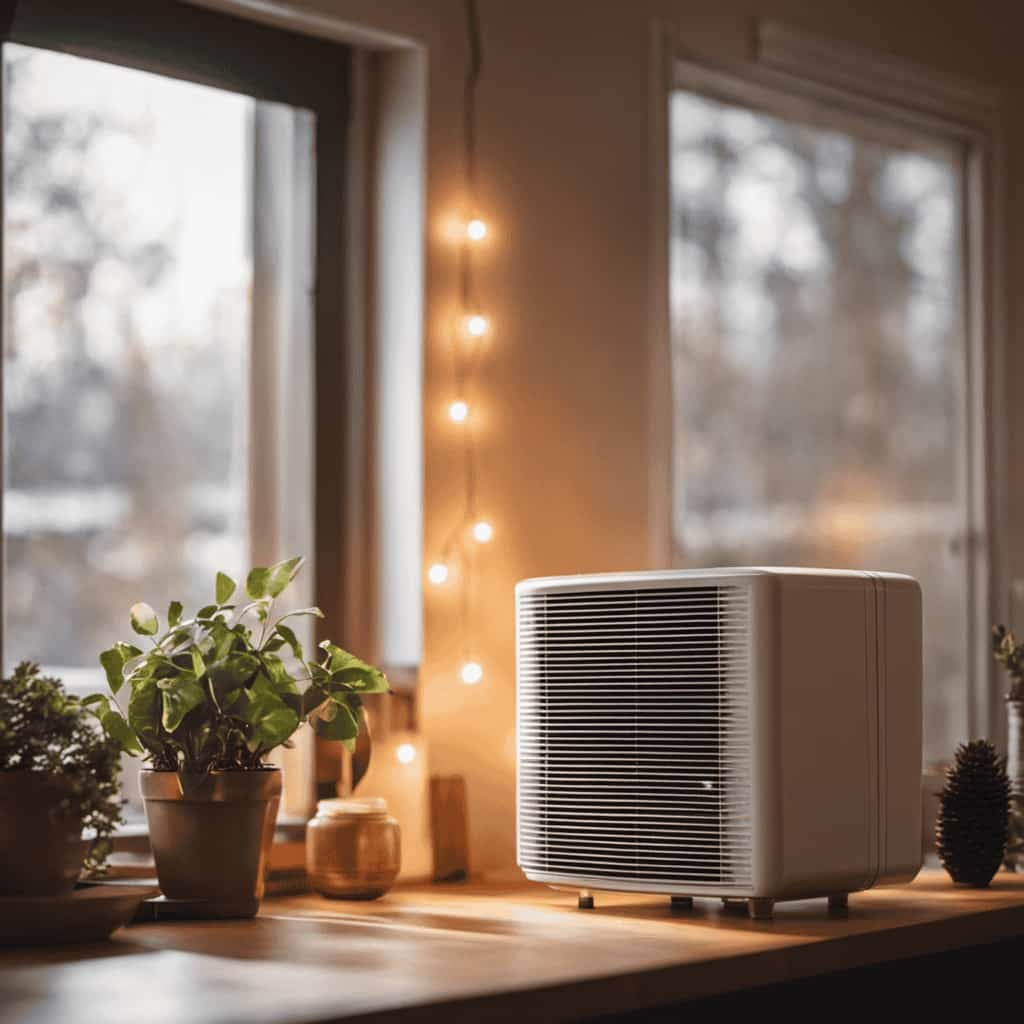We have all experienced the frustration of high energy bills and inefficient heating and cooling systems.
But what if there was a solution that could save us money and help the environment? Enter geothermal heat pump systems.
These innovative systems use the earth’s natural heat to provide efficient heating and cooling for our homes.
In this article, we’ll answer your burning questions about the efficiency of geothermal heat pump systems and explore how they can improve our lives.

Key Takeaways
- Geothermal heat pump systems utilize renewable energy sources and tap into the Earth’s natural heat to transfer heat between the ground and the building.
- Factors affecting the efficiency of geothermal heat pump systems include climate, proper system size matching, insulation, regular maintenance and servicing, and addressing issues like dirty filters and leaky ducts.
- Geothermal heat pumps are more efficient than traditional systems, providing the same level of comfort with less energy and significant energy savings.
- The installation process has a significant impact on the efficiency of geothermal heat pump systems, including proper sizing, well-designed loop for heat transfer, quality installation techniques, regular maintenance, and optimal placement and depth of ground loops for optimal heat exchange.
How Do Geothermal Heat Pump Systems Achieve High Efficiency
We achieve high efficiency in geothermal heat pump systems by maximizing the utilization of renewable energy sources. By tapping into the Earth’s natural heat, we can provide heating, cooling, and hot water for your home or business with incredible efficiency.
Geothermal heat pumps work by transferring heat between the ground and your building, using a network of underground pipes and a heat exchanger. This allows us to take advantage of the Earth’s stable temperature, which remains constant throughout the year.
Unlike traditional heating and cooling systems, geothermal heat pumps don’t rely on burning fossil fuels or consuming large amounts of electricity. Instead, they harness the power of renewable energy, reducing greenhouse gas emissions and providing a sustainable solution for your comfort needs.
With our geothermal heat pump systems, you can enjoy efficient and environmentally friendly heating and cooling all year round.

What Factors Affect the Efficiency of Geothermal Heat Pump Systems
There are several factors that can affect the efficiency of geothermal heat pump systems. These factors include:
Climate: The temperature and humidity levels in your area can impact the system’s efficiency. Geothermal heat pumps work best in moderate climates.
System size: The size of the heat pump system must be properly matched to the heating and cooling needs of your home. A system that’s too small or too large can decrease efficiency.
Insulation: Proper insulation in your home is essential for maximizing the efficiency of a geothermal heat pump system. Poor insulation can result in energy loss.
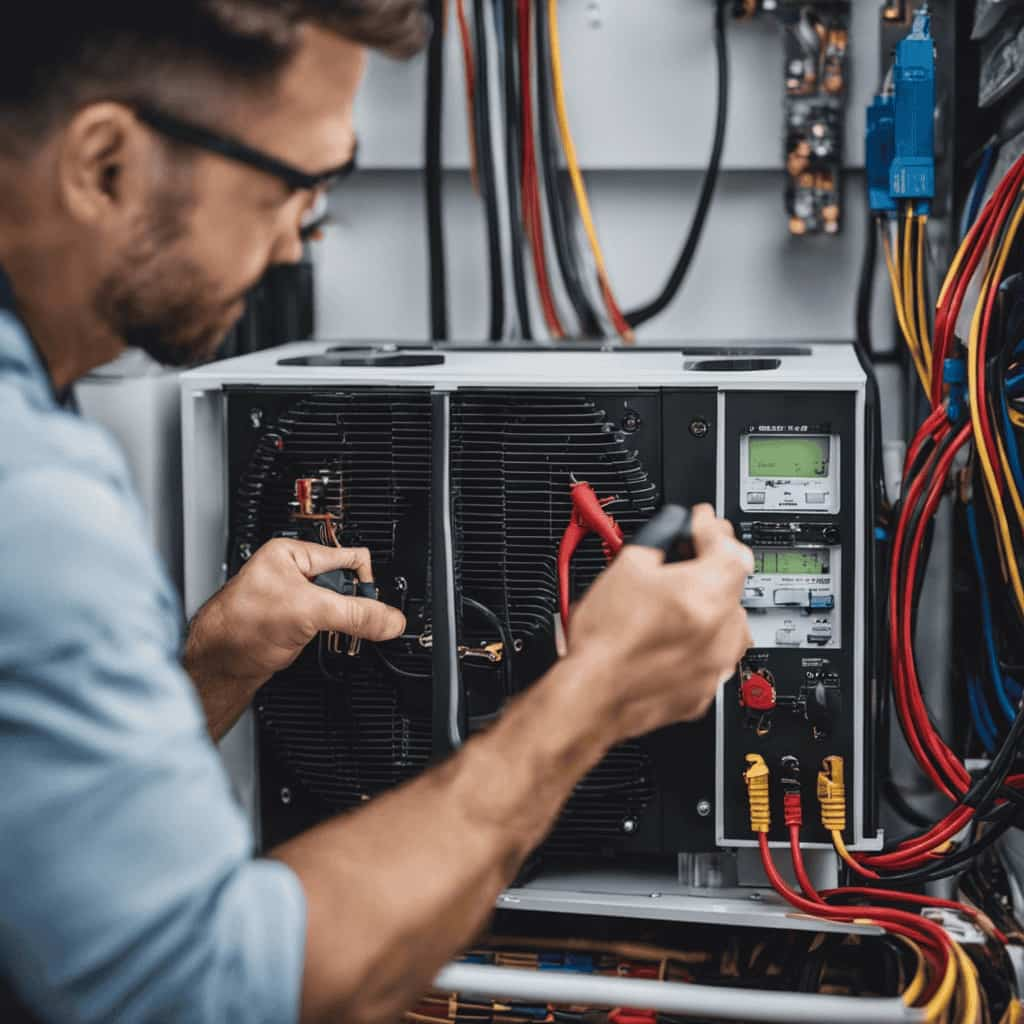
Maintenance: Regular maintenance and servicing of your heat pump system is crucial. Dirty filters, leaky ducts, and other issues can reduce efficiency.
Understanding these factors can help you optimize the efficiency of your geothermal heat pump system and ensure it operates at its full potential.
Are Geothermal Heat Pumps More Efficient Than Traditional Heating and Cooling Systems
Geothermal heat pumps are more efficient than traditional heating and cooling systems. This means that they can provide the same level of comfort while using less energy, which leads to cost savings and a reduced environmental impact. But how much more efficient are they? Let’s take a look at the table below to compare the efficiency of geothermal heat pumps with traditional systems:
| Efficiency Measure | Geothermal Heat Pumps | Traditional Systems |
|---|---|---|
| Heating Efficiency | High | Moderate |
| Cooling Efficiency | High | Moderate |
| Energy Savings | Significant | Limited |
As you can see, geothermal heat pumps outperform traditional systems in terms of both heating and cooling efficiency. This is due to their ability to tap into the stable temperature of the earth, which allows them to operate more efficiently than systems that rely on outdoor air. In the next section, we will explore how the installation process impacts the efficiency of geothermal heat pump systems.

How Does the Installation Process Impact the Efficiency of Geothermal Heat Pump Systems
When it comes to geothermal heat pump systems, the installation process plays a crucial role in determining their efficiency. We need to consider how the installation impacts the overall performance of the system.
From the proper sizing of the system to the correct placement of the underground loops, every step of the installation process can affect the efficiency of geothermal heat pump systems.
Installation and Efficiency
To maximize efficiency, we need to consider how the installation process impacts geothermal heat pump systems. Here are four key factors to keep in mind:
Proper sizing: A correctly sized system ensures optimal performance. A professional installer will assess your home’s heating and cooling needs to determine the right size for your geothermal heat pump.

Loop design: The installation of the underground loop is crucial for efficiency. A well-designed loop maximizes heat transfer and minimizes energy loss, resulting in greater system efficiency.
Quality installation: Proper installation techniques, such as sealing ducts and insulating pipes, are essential to prevent heat loss or gain. A skilled installer will ensure that the system is installed correctly to minimize energy waste.
Regular maintenance: Ongoing maintenance and system check-ups are vital for maintaining efficiency. Regular inspections, filter changes, and cleaning of the system components will help preserve its efficiency over time.
Impact on System Efficiency
During installation, we must consider how the process affects the efficiency of our geothermal heat pump systems. It’s important to understand that a proper and well-executed installation can significantly impact the overall efficiency and performance of the system. One key factor to consider is the placement of the ground loops, which are responsible for extracting or dissipating heat from the ground. Proper spacing and depth of the loops can ensure optimal heat exchange and maximize efficiency. Additionally, the quality of the installation work, including the insulation and sealing of ductwork and pipes, can prevent energy loss and improve system efficiency. By investing in a professional installation and paying attention to these details, we can ensure that our geothermal heat pump systems operate at their highest efficiency, providing us with the most cost-effective and sustainable heating and cooling solution.
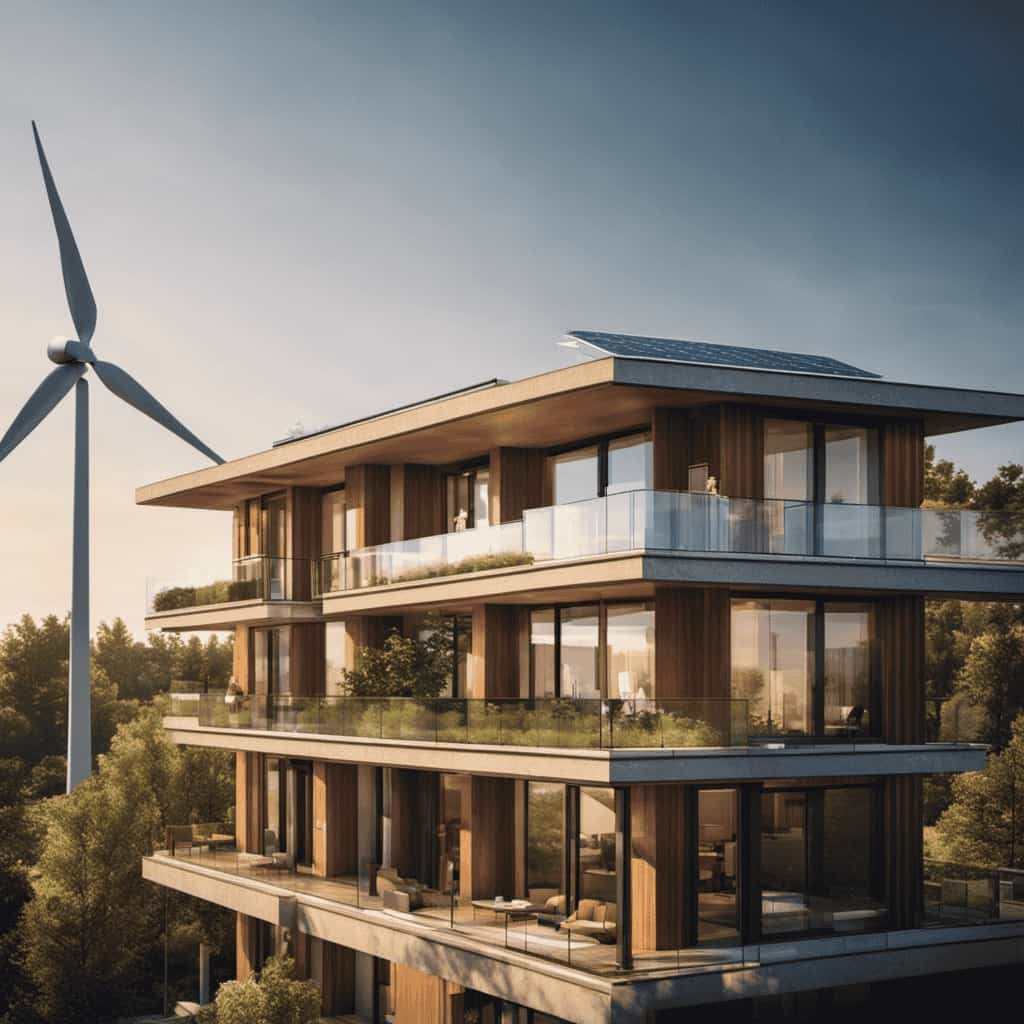
| Factors to Consider During Installation | Impact on System Efficiency |
|---|---|
| Proper placement of ground loops | Maximizes heat exchange and efficiency |
| Quality installation work | Prevents energy loss and improves efficiency |
| Insulation and sealing of ductwork and pipes | Minimizes energy waste and enhances efficiency |
Can the Efficiency of Geothermal Heat Pump Systems Be Improved Over Time
We can explore several ways to improve the efficiency of geothermal heat pump systems over time.
Firstly, technological advancements in heat pump technology can lead to more energy-efficient systems.
Secondly, regular system maintenance and upgrades can ensure that the system operates at its peak efficiency.
Lastly, implementing energy-saving practices such as optimizing system settings and insulating the home can further enhance the overall efficiency of geothermal heat pump systems.
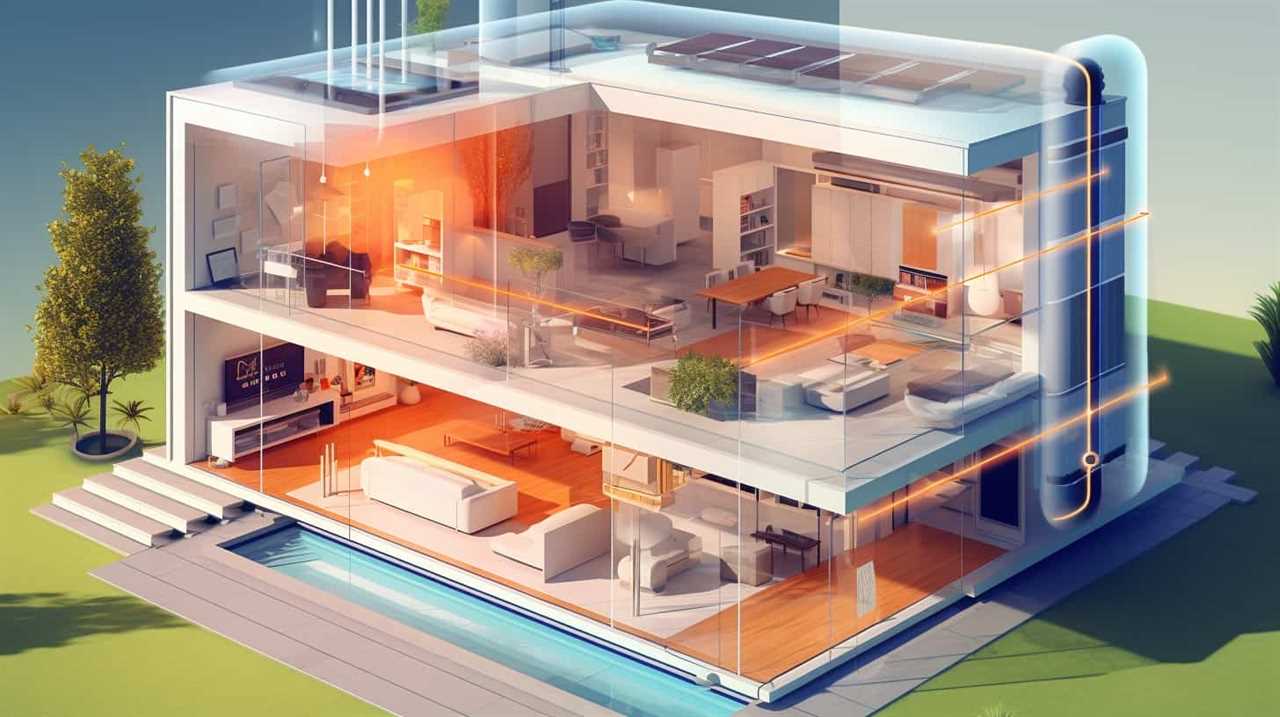
Technological Advancements for Efficiency
While advancements are constantly being made, can we improve the efficiency of geothermal heat pump systems over time? The answer is yes! As technology continues to evolve, there are several exciting developments that hold promise for enhancing the efficiency of geothermal heat pump systems:
Improved heat exchangers: Innovative designs and materials are being developed to maximize heat transfer and minimize energy loss, resulting in higher efficiency.
Enhanced control systems: Advanced algorithms and smart controls allow for better monitoring and optimization of geothermal heat pump systems, ensuring optimal performance and energy savings.
Integration with renewable energy sources: By combining geothermal heat pump systems with solar or wind power, it’s possible to further increase efficiency and reduce reliance on fossil fuels.

Geothermal drilling advancements: New drilling techniques and equipment enable more efficient and cost-effective installation of geothermal heat pump systems, making them more accessible and widespread.
With these ongoing advancements, the future looks bright for improving the efficiency of geothermal heat pump systems, providing homeowners with even greater comfort and energy savings.
System Maintenance and Upgrades
Our geothermal heat pump systems can be improved over time through regular maintenance and upgrades.
By performing routine maintenance, such as cleaning the filters, checking the refrigerant levels, and inspecting the ductwork, we can ensure that our systems operate at peak efficiency. Regular maintenance not only extends the lifespan of the system but also helps it maintain its energy-saving capabilities.

Additionally, upgrades can further enhance the efficiency of geothermal heat pump systems. For example, upgrading to a more advanced thermostat with programmable settings allows for better control over the system’s operation, optimizing energy usage. Furthermore, advancements in technology continue to improve the efficiency of geothermal heat pump systems. From improved heat exchangers to enhanced controls, these upgrades contribute to higher efficiency and lower operating costs.
With proper maintenance and strategic upgrades, our geothermal heat pump systems can continue to provide optimal performance for years to come.
Energy-Saving Practices Implementation
By implementing energy-saving practices, such as adjusting thermostat settings and optimizing insulation, we can improve the efficiency of our geothermal heat pump systems over time. Here are four ways to maximize the energy-saving potential of our systems:
Set the thermostat at the optimal temperature: Adjusting the thermostat by a few degrees can make a significant difference in energy consumption.

Use programmable thermostats: These allow us to schedule temperature changes based on our daily routine, ensuring comfort while reducing energy usage.
Seal air leaks: Properly insulating our homes and sealing any gaps or cracks will prevent heat loss and maintain a consistent indoor temperature.
Regular maintenance: Keeping our geothermal heat pump systems clean and well-maintained ensures optimal performance and energy efficiency.
What Are the Long-Term Cost Savings Associated With the Efficiency of Geothermal Heat Pump Systems?
Geothermal heat pump systems can significantly reduce long-term costs by consistently providing efficient heating and cooling. These systems harness the Earth’s natural heat to warm your home in the winter and cool it in the summer, resulting in lower energy consumption and utility bills.

The long-term cost savings associated with geothermal heat pump systems are impressive. According to studies, homeowners can expect to save anywhere from 30% to 70% on their heating and cooling costs compared to traditional HVAC systems. Additionally, geothermal systems require less maintenance and have a longer lifespan, further reducing long-term expenses.
Frequently Asked Questions
How Much Does a Geothermal Heat Pump System Cost to Install?
Installing a geothermal heat pump system can vary in cost depending on factors such as location and system size. However, it is a worthwhile investment as it can significantly reduce energy bills and provide long-term savings.
Are There Any Government Incentives or Rebates Available for Installing a Geothermal Heat Pump System?
Yes, there are government incentives and rebates available for installing a geothermal heat pump system. We were thrilled to discover that we could save thousands of dollars through these programs, making the investment even more attractive.
Can a Geothermal Heat Pump System Be Used for Both Heating and Cooling a Home?
Yes, a geothermal heat pump system can be used for both heating and cooling a home. It uses the stable temperature of the ground to efficiently transfer heat, providing comfort year-round.
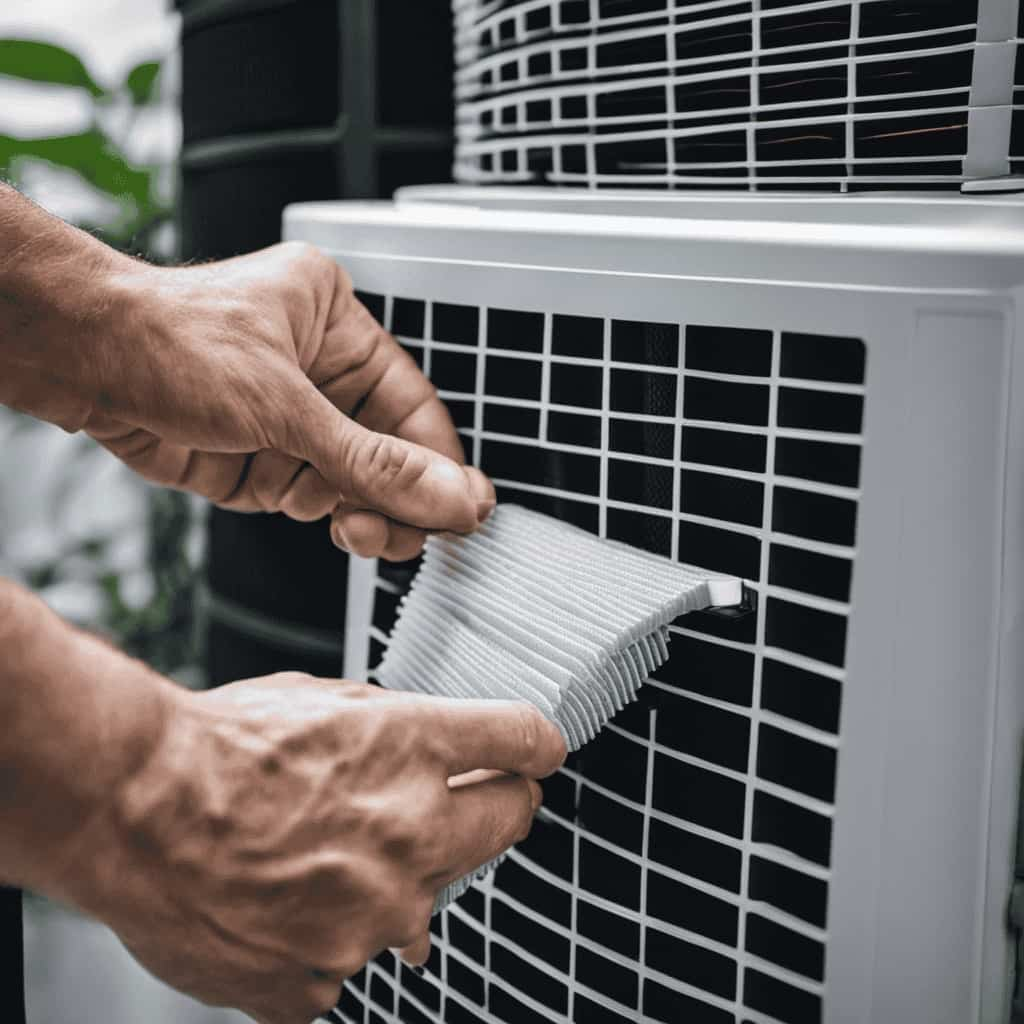
Are Geothermal Heat Pump Systems Suitable for All Climates?
Yes, geothermal heat pump systems are suitable for all climates. They provide efficient heating and cooling, like a gentle breeze on a hot day or a warm embrace on a chilly night.
How Long Does It Take for a Geothermal Heat Pump System to Pay for Itself in Energy Savings?
It typically takes a geothermal heat pump system around 5-10 years to pay for itself in energy savings. However, the exact time frame can vary depending on factors like installation costs and energy prices.
What Are the Efficiency Benefits of Geothermal Heat Pump Systems?
Geothermal heat pump systems offer numerous efficiency benefits compared to traditional heating and cooling systems. With high geothermal heat pump efficiency, these systems can provide up to 400% energy efficiency, reducing energy consumption and lowering utility bills. They effectively transfer heat from the ground to provide heating during winters and cooling during summers, making them a sustainable and cost-effective solution for comfortable indoor environments.
Conclusion
In conclusion, geothermal heat pump systems are simply not worth the hype. Despite claims of high efficiency and cost savings, the reality is far from impressive.
The installation process is complex and costly, and any potential improvements in efficiency over time are negligible. When it comes to heating and cooling systems, traditional options still reign supreme.

Don’t be fooled by the allure of geothermal heat pumps – stick with what works.


